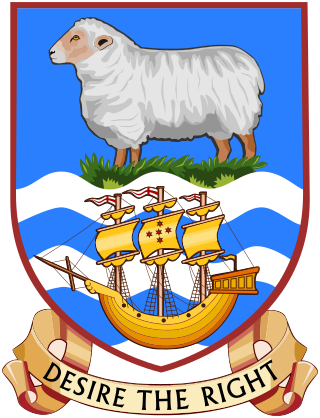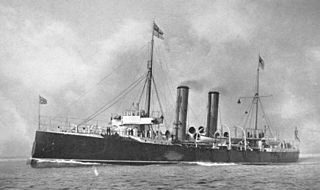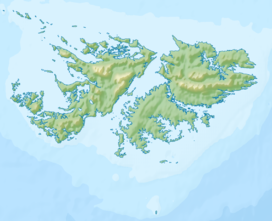
The history of the Falkland Islands goes back at least five hundred years, with active exploration and colonisation only taking place in the 18th century. Nonetheless, the Falkland Islands have been a matter of controversy, as they have been claimed by the French, British, Spaniards and Argentines at various points.

The politics of the Falkland Islands takes place in a framework of a constitutional monarchy and parliamentary representative democratic dependency as set out by the constitution, whereby the Governor exercises the duties of head of state in the absence of the monarch and the Chief Executive is the head of the Civil Service, with an elected Legislative Assembly to propose new laws, national policy, approve finance and hold the executive to account.

The Falklands War was a ten-week undeclared war between Argentina and the United Kingdom in 1982 over two British dependent territories in the South Atlantic: the Falkland Islands and its territorial dependency, South Georgia and the South Sandwich Islands. The conflict began on 2 April 1982, when Argentina invaded and occupied the Falkland Islands, followed by the invasion of South Georgia the next day. On 5 April, the British government dispatched a naval task force to engage the Argentine Navy and Air Force before making an amphibious assault on the islands. The conflict lasted 74 days and ended with an Argentine surrender on 14 June, returning the islands to British control. In total, 649 Argentine military personnel, 255 British military personnel, and three Falkland Islanders were killed during the hostilities.

Stanley is the capital city of the Falkland Islands. It is located on the island of East Falkland, on a north-facing slope in one of the wettest parts of the islands. At the 2016 census, the city had a population of 2,460. The entire population of the Falkland Islands was 3,398 on Census Day - 9 October 2016.

Weddell Island is one of the Falkland Islands in the South Atlantic, lying off the southwest extremity of West Falkland. It is situated 1,545 km (960 mi) west-northwest of South Georgia Island, 1,165 km (724 mi) north of Livingston Island, 606 km (377 mi) northeast of Cape Horn, 358 km (222 mi) northeast of Isla de los Estados, and 510 km (320 mi) east of the Atlantic entrance to Magellan Strait.
The pound is the currency of the Falkland Islands, a British Overseas Territory in the South Atlantic Ocean. The symbol is the pound sign, £. The ISO 4217 currency code is FKP.

Admiral Sir Bartholomew James Sulivan, was a British naval officer and hydrographer. He was a leading advocate of the value of nautical surveying in relation to naval operations.
Sovereignty over the Falkland Islands is disputed by Argentina and the United Kingdom. The British claim to sovereignty dates from 1690, when they made the first recorded landing on the islands, and the United Kingdom has exercised de facto sovereignty over the archipelago almost continuously since 1833. Argentina has long disputed this claim, having been in control of the islands for a few years prior to 1833. The dispute escalated in 1982, when Argentina invaded the islands, precipitating the Falklands War.
Bartolomé Island is a volcanic islet in the Galápagos Islands group, just off the east coast of Santiago Island. It is one of the "younger" islands in the Galápagos archipelago. This island, and Sulivan Bay on Santiago island, are named after naturalist and lifelong friend of Charles Darwin, Sir Bartholomew James Sulivan, who was a lieutenant aboard HMS Beagle.

The Falkland Islands is an archipelago in the South Atlantic Ocean on the Patagonian Shelf. The principal islands are about 300 mi (480 km) east of South America's southern Patagonian coast and about 752 mi (1,210 km) from Cape Dubouzet at the northern tip of the Antarctic Peninsula, at a latitude of about 52°S. The archipelago, with an area of 4,700 sq mi (12,000 km2), comprises East Falkland, West Falkland, and 776 smaller islands. As a British overseas territory, the Falklands have internal self-governance, but the United Kingdom takes responsibility for their defence and foreign affairs. The capital and largest settlement is Stanley on East Falkland.
Chartres is one of the main settlements on West Falkland, in the Falkland Islands. It is on the west coast of West Falkland, at the mouth of Chartres River, at the eastern shore of King George Bay. One of the two only proper roads on West Falkland runs between Chartres and Port Howard. It is one of the closest settlements to Mount Adam to the North, the highest point on West Falkland.
Lake Sulivan is a body of water on West Falkland, Falkland Islands. It is the largest body of fresh water in the islands. Lake Sulivan is very tiny, but it is the largest lake in the Falkland Islands, which have very little area but many bays.
The Falkland Islands Football League (FIFL) is the governing body of football in the Falkland Islands. The association operates the national team and the Stanley Services League, a domestic indoor football league on the islands. They also sponsor an all-star team from the league, called Stanley F.C., who occasionally play friendly matches against stationed troops on the islands and Royal Navy makeshift teams.

HMS Philomel was an eight-gun Alert-class packet brig of the Royal Navy, built between 1840 and 1842. Ships of this class were designed by William Symonds in 1834, and the Philomel was built at Plymouth.
Sulivan is a surname. Notable people with the surname include:

The South East Coast of America Station was a formation of the Royal Navy which existed from 1838 until just after the end of the 19th century.

Weddell Settlement is the only settlement on Weddell Island in the Falkland Islands, situated on the east coast of the island at the head of the sheltered Gull Harbour, part of Queen Charlotte Bay. It is located 12.15 kilometres (7.55 mi) northeast of Race Point, 15 kilometres (9.3 mi) south by west of Swan Point, 212 kilometres (132 mi) west-southwest of Stanley and 56.6 kilometres (35.2 mi) west of Fox Bay on West Falkland.

Gull Harbour is the 1.3 km wide bay indenting for 2.8 km the east coast of Weddell Island in the Falkland Islands. It is entered north of Gull Point and south of Mark Point, and is centred at 51°53′56″S60°53′20″W. The principal settlement of the island, Weddell Settlement, is situated at the head of the bay. Until the mid-nineteenth century Gull Harbour was known as Great Harbour.

The COVID-19 pandemic in the Falkland Islands is part of the worldwide pandemic of coronavirus disease 2019 caused by severe acute respiratory syndrome coronavirus 2. The virus was confirmed to be in the islands on 3 April 2020. During the first wave, the number of cases peaked at 13, with all being from the military base at Mount Pleasant leaving none from the general population. All 13 patients recovered. On 10 November, a new case was discovered. As of 4 May 2022 a total of 195 people were confirmed to have been infected.












